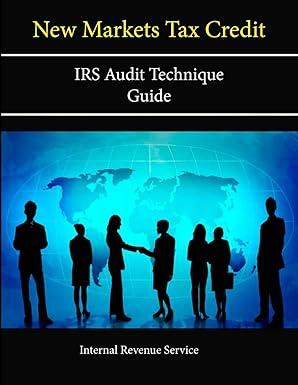Question
Most guaranteed payments from partnerships and wages from S Corporations are subject to the full 15.3% FICA tax. Flow-through income from partnerships is sometimes subject
Most guaranteed payments from partnerships and wages from S Corporations are subject to the full 15.3% FICA tax. Flow-through income from partnerships is sometimes subject to FICA tax while S corp flow-through income is not subject to FICA tax. Cash distributions are not subject to tax, nor are they a deductible expense. Services contributed to a partnership are often compensated through guaranteed payments from the partnership. These are treated as salary payments on which the partner receiving them must pay payroll taxes which is why partners sometimes try to classify themselves as limited partners who would not be responsible for management of the partnership, so their share of partnership income is not subject to self-employment taxes. S corporation shareholders generally prefer dividend distributions of their S corporations profits over compensation payments from their S corporations because the compensation payments are subject to FICA taxes and dividend distributions are not. (We cover S corporations in later in the course.) S Corporations often get the IRSs attention for paying too little salaryunreasonably low compensation. C Corporations on the other hand want to increase salary to employees and lower dividends distributions because the corporation does not get a tax deduction for the dividends issued to the shareholders. A small closely-held C Corporation pays excess earnings to employee/owners as a bonus so its income tax liability decreases. Often, the employee/owners compensation exceeds the social security wage thresholds so an end of year bonus is not subject to the full 15.3% FICA tax. C Corporations often get the IRSs attention for paying too much salary unreasonably high compensation. In the eyes of the Service, these distinctions by pass-throughs have caused great abuses and tax avoidance. The GAO has reported in the past that S corporations had underreported their shareholder compensation by $24.6 billion, with corporations with fewer than three shareholders responsible for nearly all the underreporting. This issue reached a boiling point in Watson v. Commissioner, 668 F.3d 1008 (8th Cir. 2012). (I assume no relation to our classmate, Jason). In this case, Watson was an accountant in a firm he owned. He drew a salary of $24,000 even though the firm grossed nearly $3 million in revenue. Watson was a Certified Public Accountant with advanced degrees. The 8th Circuit Court ruled that a reasonable person would consider the dividends paid to Watson to be remuneration for services performed as opposed to a return on investment. To support its position, the IRS successfully asserted that the $24,000 shareholder salary was not enough to support Watsons lifestyle. As such, his dividends were reclassified as wages and the firm was assessed huge employment taxes plus penalties and interest. Using the findings in Watson as a model and to prevent S corporations and their shareholders and LLCs operating as partnerships from avoiding payroll taxes by maximizing distributions and minimizing compensation payments, the IRS now requires S corporations and partnerships to pay shareholders and general partners who provide substantial services reasonable compensation. The IRS makes its compensation determinations using three factors: Employee performance; Salary comparisons; and Company conditions. Do these factors seem fair to you in judging the compensation an employee receives? Yes/No Why? Do you have a better way to determine how much compensation is enough?
Step by Step Solution
There are 3 Steps involved in it
Step: 1

Get Instant Access to Expert-Tailored Solutions
See step-by-step solutions with expert insights and AI powered tools for academic success
Step: 2

Step: 3

Ace Your Homework with AI
Get the answers you need in no time with our AI-driven, step-by-step assistance
Get Started


